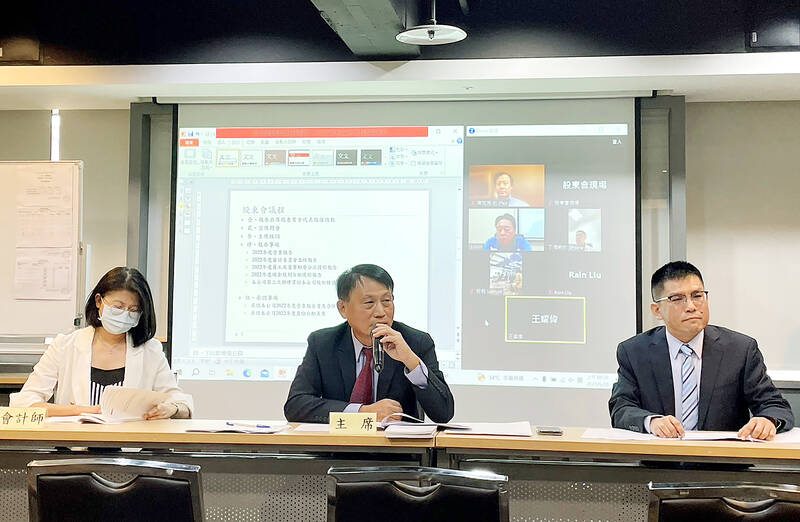ShunSin Technology Holdings Ltd (訊芯科技), a semiconductor arm of Hon Hai Precision Industry Co (鴻海精密), yesterday announced the election of Chiang Shang-yi (蔣尚義) as its new chairman.
Chiang, a former joint chief operating officer of Taiwan Semiconductor Manufacturing Co (TSMC, 台積電), in November last year joined Hon Hai as its chief strategy officer to integrate the resources of its semiconductor subsidiaries, including ShunSin.
ShunSin specializes in offering system-in-a-package modules and optical transceivers.

Photo: CNA
“We believe Chiang will have a positive impact on ShunSin,” company president Hsu Wen-yi (徐文一) told reporters on the sidelines of the company’s annual shareholders’ meeting in Taipei.
“We have talked about Hon Hai’s efforts to deeply integrate all of its semiconductor subsidiaries. We believe artificial intelligence [AI], semiconductors and next-generation communications are the areas Hon Hai will focus on in the future,” Hsu said.
Talking about ShunSin’s third-quarter outlook, Hsu said the company is seeing a comeback of customer orders, following three quarters of inventory digestion since the fourth quarter of last year.
Orders are increasing gradually, he said.
During the first five months of this year, ShunSin’s revenue expanded 27.86 percent year-on-year to NT$2.09 billion (US$67.26 million).
Last year, the company’s revenue rose 24.53 percent to NT$5.32 billion from a year earlier, with high-speed optical transceivers contributing about 75 percent, compared with 40 percent in 2021, boosted by extra capacity from a new factory in Vietnam, Hsu said.
ShunSin is expected to benefit from rapidly growing AI applications and fiber-optical deployment worldwide, the company said.
Its new advanced 400G high-speed optical transceiver is to enter volume production by the end of this year, and a more advanced 800G high-speed optical transceiver is to start mass production next year in Vietnam for US customers, it said.
The 800G high-speed optical transceivers are to be used in AI servers, which are expected to see explosive growth in 2025, Hsu said.
In contrast, the company’s SiP business encountered severe headwinds due to a semiconductor crunch last year, with revenue accounting for a mere 20 percent of the total, down from 50 percent in the prior year.
ShunSin shareholders yesterday approved a proposal to distribute a cash dividend of NT$1.17 a share, implying a payout ratio of 61 percent based on the company’s earnings per share of NT$1.92 last year.
Shareholders also approved the company’s proposal to list its subsidiary ShunYun Technology Holdings Ltd (訊芸), which makes high-speed optical transceivers, on the Chinese stock market.
ShunSin said it plans to submit ShunYun’s application for an initial public offering to the Chinese regulator next year.

When an apartment comes up for rent in Germany’s big cities, hundreds of prospective tenants often queue down the street to view it, but the acute shortage of affordable housing is getting scant attention ahead of today’s snap general election. “Housing is one of the main problems for people, but nobody talks about it, nobody takes it seriously,” said Andreas Ibel, president of Build Europe, an association representing housing developers. Migration and the sluggish economy top the list of voters’ concerns, but analysts say housing policy fails to break through as returns on investment take time to register, making the

NOT TO WORRY: Some people are concerned funds might continue moving out of the country, but the central bank said financial account outflows are not unusual in Taiwan Taiwan’s outbound investments hit a new high last year due to investments made by contract chipmaker Taiwan Semiconductor Manufacturing Co (TSMC, 台積電) and other major manufacturers to boost global expansion, the central bank said on Thursday. The net increase in outbound investments last year reached a record US$21.05 billion, while the net increase in outbound investments by Taiwanese residents reached a record US$31.98 billion, central bank data showed. Chen Fei-wen (陳斐紋), deputy director of the central bank’s Department of Economic Research, said the increase was largely due to TSMC’s efforts to expand production in the US and Japan. Investments by Vanguard International

WARNING SHOT: The US president has threatened to impose 25 percent tariffs on all imported vehicles, and similar or higher duties on pharmaceuticals and semiconductors US President Donald Trump on Wednesday suggested that a trade deal with China was “possible” — a key target in the US leader’s tariffs policy. The US in 2020 had already agreed to “a great trade deal with China” and a new deal was “possible,” Trump said. Trump said he expected Chinese President Xi Jinping (習近平) to visit the US, without giving a timeline for his trip. Trump also said that he was talking to China about TikTok, as the US seeks to broker a sale of the popular app owned by Chinese firm ByteDance Ltd (字節跳動). Trump last week said that he had

STRUGGLING TO SURVIVE: The group is proposing a consortium of investors, with Tesla as the largest backer, and possibly a minority investment by Hon Hai Precision Nissan Motor Co shares jumped after the Financial Times reported that a high-level Japanese group has drawn up plans to seek investment from Elon Musk’s Tesla Inc to aid the struggling automaker. The group believes the electric vehicle (EV) maker is interested in acquiring Nissan’s plants in the US, the newspaper reported, citing people it did not identify. The proposal envisions a consortium of investors, with Tesla as the largest backer, but also includes the possibility of a minority investment by Hon Hai Precision Industry Co (鴻海精密) to prevent a full takeover by the Apple supplier, the report said. The group is